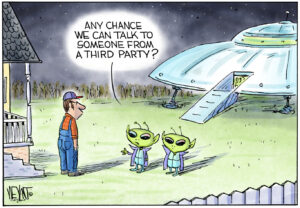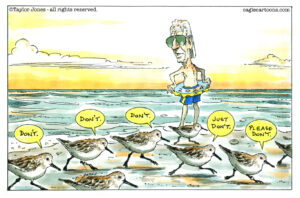Republicans, to Their Peril, Stand With Bush
Now that Republicans in Congress have expressed their overwhelming support for the status quo in Iraq, the war has gone from Bush's pet disaster to the albatross around his party's neck.WASHINGTON — From its inception, the Iraq war has been George W. Bush’s signature project.
It was conceived by a small band of neoconservatives who had on their side the vice president’s robust agreement and unflagging determination to have the United States return to Iraq. They, in turn, had the president’s ear.
The public has long seen Iraq as Bush’s war. It is why his approval ratings soared with what appeared to be initial success, and why they have sunk with the prospects for anything resembling an American victory.
Now the war belongs to the Republican Party.
That is really what happened in the House the other day. All but two Republicans opposed the Democrats on the vote in favor of a war funding measure that seeks to wind down American military involvement with a set of political benchmarks the Iraqi government and Bush himself have long espoused but never attained.
The same is about to occur in the Senate, when it votes this week on a war spending bill that includes a “goal” — but no requirement — of bringing U.S. combat troops home in a year. Having first blocked even debate on a nonbinding resolution on Iraq in the Senate, Republicans there now will be almost unanimous in opposing this more robust bill.
They are standing with Bush.
And so, just as Vietnam-era war protesters and later Jimmy Carter’s Iranian hostage crisis tarred Democrats with public perceptions that they were dangerously incompetent on foreign policy in general and in military matters in particular, Iraq may leave an indelible mark of political shame on Republicans. The Pew Research Center, in its annual survey of American political values, reveals plummeting Republican fortunes across the board.
With the Iraq votes as the backdrop, the shift in public sentiment about the proper course of U.S. foreign and military policy is striking.
In the summer of 2002 — less than a year after the 9/11 attacks and just as Bush was revving up his public-relations push for invading Iraq — 62 percent of Americans agreed that “the best way to ensure peace is through military strength.” The proportion is now down to 49 percent, the lowest figure in the 20-year history of Pew values surveys, the researchers note. Likewise, those who agree that the United States should “get even” with any country that takes “advantage” of it have plunged from 61 percent in 2002 to 40 percent. That also is the lowest number registered in two decades.
The notion of pre-emptive war — the heart of the Bush doctrine — still is supported by 55 percent, but that, too, is down from the two-thirds who agreed in 2003. Meanwhile, support for the United Nations, that favorite conservative bugaboo, has climbed.
The public hasn’t only soured on Iraq. It’s sick of dangerous bombast masquerading as foreign policy.
Yet, unmistakable swagger still animates Bush’s foreign policy — and echoes through the talking points Republicans recite. Rep. Tom Price, R-Ga., debating the House measure, declared that Democrats want to “accept defeat at any cost.” House Republican leader John Boehner of Ohio went so far as to charge that the Iraq funding measure would “end Israel as I know it” and allow terrorists to “find us on the streets of America instead of the streets of Baghdad.”
Defining the end of one political era and the start of another is never a neat task. What’s most apparent now is that the public hysteria following the terrorist attacks of Sept. 11, 2001 — a fear whipped into frenzy as the Bush administration sought to promote the Iraq invasion — has abated. The incompetent treatment given gravely wounded soldiers and their families likewise diminishes the Republicans’ claim to be the party most supportive of the military.
The Republicans’ deeper problem is that they still cannot answer the question Rep. Patrick Murphy, D-Pa., posed during the House debate. The former Army captain and Iraq veteran recounted questions he said his gunner had asked, as their convoy moved through a perilous area known for ambushes. “He said, ‘Sir, what are we doing over here? What’s our mission? When are these Iraqis going to come off the sidelines and fight for their own country?’ “
Blind support for Bush’s war helped doom the Republicans last November. The defeat may or may not portend a long-term hazard. But it may well be the first sign that the Iraq misadventure does for Republicans what Vietnam did for Democrats.
Marie Cocco’s e-mail address is mariecocco(at symbol)washpost.com.
© 2007, Washington Post Writers Group
Your support matters…Independent journalism is under threat and overshadowed by heavily funded mainstream media.
You can help level the playing field. Become a member.
Your tax-deductible contribution keeps us digging beneath the headlines to give you thought-provoking, investigative reporting and analysis that unearths what's really happening- without compromise.
Give today to support our courageous, independent journalists.






You need to be a supporter to comment.
There are currently no responses to this article.
Be the first to respond.